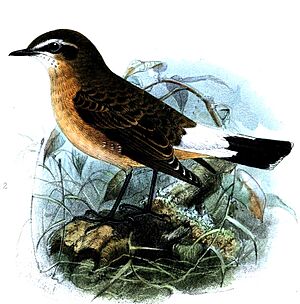Heuglin's wheatear facts for kids
Quick facts for kids Heuglin's wheatear |
|
|---|---|
 |
|
| Illustration by John Gerrard Keulemans | |
| Conservation status | |
| Scientific classification |
|
| Kingdom: | Animalia |
| Phylum: | Chordata |
| Class: | Aves |
| Order: | Passeriformes |
| Family: | Muscicapidae |
| Genus: | Oenanthe |
| Species: |
O. heuglinii
|
| Binomial name | |
| Oenanthe heuglinii (Heuglin, 1869)
|
|
| Script error: The function "autoWithCaption" does not exist. | |
| Synonyms | |
|
Oenanthe bottae heuglini |
|
Script error: No such module "Check for conflicting parameters".
Heuglin's wheatear is a small bird known for its unique look. It belongs to a group of birds called wheatears. These birds are found in different parts of the world.
Contents
About Heuglin's Wheatear
This bird is quite small, usually about 13 to 14 centimeters long. That's roughly the length of a pen!
What Does It Look Like?
Adult Heuglin's wheatears have dark grey-brown feathers on their backs. They have a black "mask" around their eyes. A white stripe sits just above each eye. Their chest is a warm orange-buff color, which fades to a lighter shade on their throat and belly.
Their tail is mostly black. However, the sides of the bottom half of the tail are white. The feathers under and over the tail are also white. The feathers under their wings are a pretty buff-pink color.
What Does It Sound Like?
Heuglin's wheatear has a long and complex song. It often includes sounds that copy other birds! Its call is a harsh sound, like "chack."
Where Do They Live?
Heuglin's wheatear lives in the Sahel region of Africa. This area stretches from Mauritania in the west all the way to Eritrea in the east. You can find them in countries like Mali, Niger, Chad, and Sudan.
They also live further south in parts of Ghana, Togo, Benin, Nigeria, Cameroon, the Central African Republic, Uganda, and north-west Kenya.
Their Home Environment
These birds like open areas with rocks and short grass. You might often spot them on ground that has recently been burned. Some Heuglin's wheatears stay in one place all year. Others travel, moving from one area to another at certain times of the year.
What Do They Do?
Heuglin's wheatears mainly eat insects. When they are showing off or communicating, they wag their tails. They also spread their tails out wide.
These birds are usually quite shy. During the breeding season, you will often see them in pairs. In winter, they might gather in small groups.
How Was It Named?
Heuglin's wheatear used to be considered a type of red-breasted wheatear. That bird lives in the Ethiopian Highlands and Arabia. However, scientists now see Heuglin's wheatear as its own separate species. This is because it has different sizes, lives in different places, and acts differently.
The bird is named after Theodor von Heuglin. He was a German explorer and expert on birds.
 | Victor J. Glover |
 | Yvonne Cagle |
 | Jeanette Epps |
 | Bernard A. Harris Jr. |


